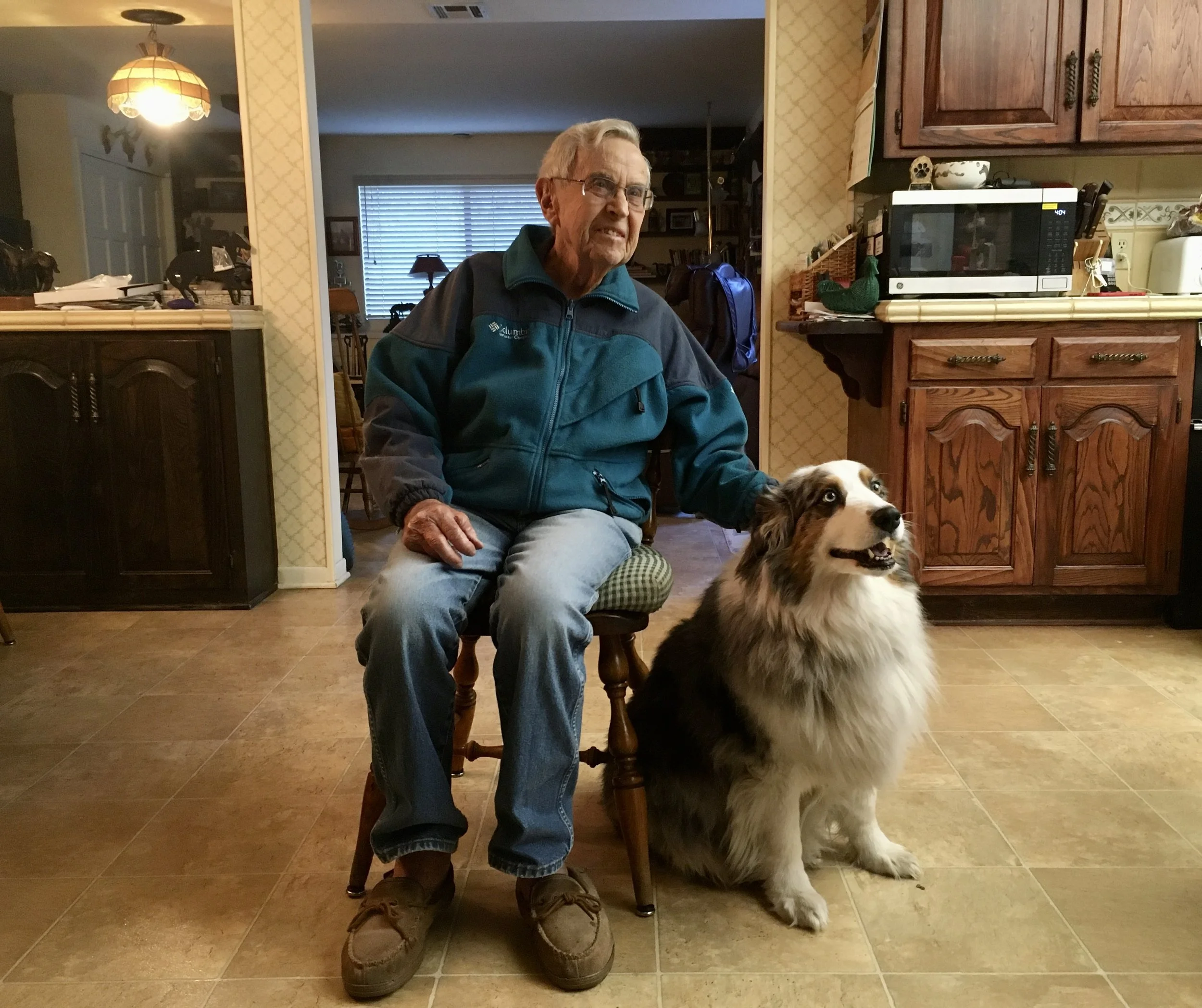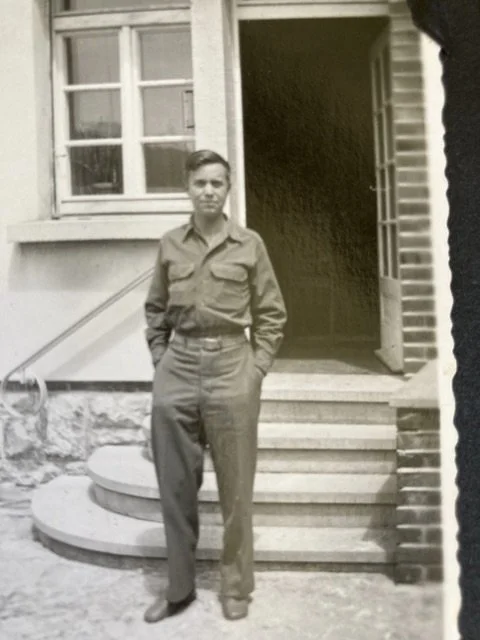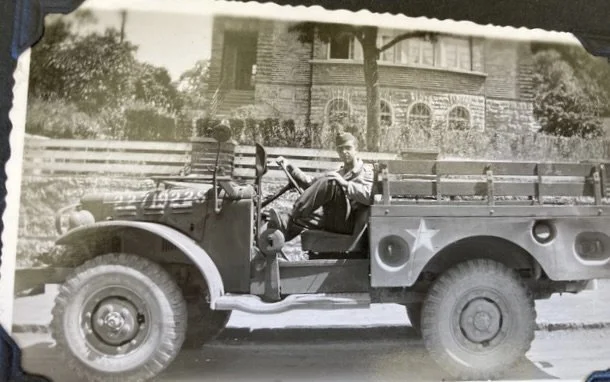Dr. Robert Miller: One of the Last Remaining WWII Veterans
Dr. Robert Miller with his dog Oliver! Photo by Natalia Radcliffe
~ Natalia Radcliffe ~We’ve had the pleasure of talking with renowned veterinarian Dr. Robert Miller recently. In honor of Veteran’s Day just having passed, we’d like to share some stories of his time serving in the military when he was a young adult.
World War II.
It lasted from 1939 through 1945. A lot can happen in 6 years, you know.
For Dr. Miller, he grew from a young teen to a young adult.
He was 14 when WWII started. He never imagined the war would go on for as long as it did.
He remembers the day Pearl Harbor was attacked.
It was a Sunday morning, and he was listening to the radio. He heard that a place called Pearl Harbor was being fired on. His dad was home at the time, and he remembers asking him where it was. Was it in Hawaii, perhaps? That’s what the radio said. His dad didn’t know, but curious, stopped to listen to the radio show.
As he was ingesting the information, Dr. Miller remembers his dad exclaiming, “Oh my God.”
Those three words conveyed the seriousness of the situation. Young Dr. Miller may not have completely understood what was going on, but his father did. His father knew the potential repercussions that could come with attacking U.S. soil without warning.
Sure enough, the United States became involved in World War II shortly after.
When he was 18, Dr. Miller was drafted for the war. He was sent off to a military camp in South Carolina for infantry training. One of the first things all the recruits did when they arrived at the camp was introduce themselves to each other and shake hands.
Dr. Miller as a young adult in the military. Photo courtesy of Dr. Miller.
Dr. Miller shook hands with the people on either side of him, introducing himself.
The leader of the group then explained this: look to your right, and look to your left. Out of the three of you, one of you will not be coming back home.
At this point, the war hadn’t ended yet. Each person was preparing themselves to go off to battle. It was a difficult concept to think about, but it was true. Dr. Miller, confident, thought it definitely wasn’t going to be him who wouldn’t make it back.
And, thankfully, that was the case.
While in training, Dr. Miller was very interested in transferring to a special division, the 10th Mountain Division training center. You had to have letters of reference and the like in order to be accepted. They were looking for people who had a preference for the outdoors and serving in a mountain atmosphere. Learning to ski was something that caught Dr. Miller’s eye. He was determined to get into that division.
It looked like things were going that way, until one fateful day.
The United States bombed Japan.
Dr. Miller remembered being told by his superiors that the United States had bombed Japan. Some of the other people in his group cheered, but Dr. Miller stayed silent. He was more concerned with the repercussions it would bring. Being an avid reader, he often perused the magazine Popular Mechanics. One article he had read had talked about what could happen if people ever harnessed the power of the atom. He didn’t know the kind of bomb that was dropped on Japan, but he wondered. Could scientists have already figured it out? If so, what would the impact be?
And how it did change the world. The corresponding Cold War that came after forever altered how we view war.
Dr. Miller was lucky. He never had to experience the effects of WWII firsthand. He had only been in the Army for a few months before the war ended.
But, that didn’t mean his service was over. He still had to serve for the allotted time. Unfortunately, his prospects of being in the 10th Mountain Division were up in the air. He was initially transferred to a casual company, as his superiors didn’t know what to do with him yet. He was given the very exciting job of permanent kitchen police.
Thankfully, he didn’t have to spend his entire service on this duty. Eventually, he and others were told they were going to Europe, as part of the U.S. army occupation at the time.
They traveled by boat. They were still on submarine evasion, as the news of the war ending hadn’t reached all parts of the involved countries’ militaries yet. As such, the trip took a good deal longer than normal.
How much longer?
Well, it normally takes a ship 4-5 days to get to Europe.
Traveling by a submarine evasion course?
A few weeks.
When they finally arrived, they stepped foot on land in France. Dr. Miller was at a loss for words at the destruction he saw. They stayed in a castle that was being managed by the U.S. military for a few days, before Dr. Miller and some others made their way to Germany. The group that went consisted of 12 Americans. The captain was a man who was in his 60s and a WWI veteran.
Surprised?
You see, most of those who had fought in the war were being sent home, and those who hadn’t had as much experience were being stationed in different areas across various countries in Europe.
The group settled in a small country village in Germany. This particular region didn’t have as much damage as other parts of the country. Naturally, German was the preferred language to communicate with, both with the locals and fellow English and Russian allies. Dr. Miller had taken the time to pay attention to the German classes offered during the few weeks of travel from the United States. As a result, he could make himself understood fairly well.
Dr. Miller turning his time serving in Germany. Photo courtesy of Dr. Miller.
In fact, he was so confident in his German, he accidentally told some Russian allies his captain had syphilis!
The story goes like this:
Some Russians had come to the residence the U.S. military were staying in, asking to see the captain. However, the captain wasn’t feeling too well that day, and had told Dr. Miller to tell any visitors who came asking for him that he couldn’t speak with them for the day. When the Russian allies came asking for the captain, Dr. Miller told them in German the captain wasn’t able to see them that day, as he wasn’t feeling well. He was in bad shape, you see. The people looked very stunned at his response, which confused Dr. Miller. It was only later when he was talking with the housekeeper who helped look after the house they were staying in, that he learned what he really said. She told him that he actually said his captain had syphilis!
No wonder the Russian visitors looked so shocked.
While in Germany, one of Dr. Miller’s assignments was to make sure the detachment had fresh meat. He often did this by hunting deer, as the area was overrun with the species. The Germans weren’t allowed to carry firearms at the time, so it fell to Dr. Miller and his detachment to help take care of the problem. They had a local guide who would accompany them, pointing out the places that had a particularly high concentration. The U.S. military was so efficient and accurate with their shots while hunting that the guide remarked, “Now I know why you won the war.”
It wasn’t all fun and games during his time in the military, however. Dr. Miller also saw, up close and personal, the effects the war had on Germany. He investigated war crimes committed by the Germans, and even represented the U.S. army in some legal cases. It was during these experiences he decided he definitely wasn’t going to pursue law as a career once his time in the military was finished. He also met some concentration camp survivors. Those he could communicate with described how they were the only ones left in their family, the only survivors who made it.
It was a different life in Germany. Though he didn’t see any fighting, Dr. Miller still saw the terrible aftermath of what a world war can leave. It gave him a healthy respect for peace, and, to this day, he’s still wary of war. Can you blame him?
While talking with him, he remarked he hadn’t thought of these memories for a long time. For a while after he came home, he ruminated on them quite often, but, as the years went by, he thought about them less and less. Such is the effect of the passage of time.
But, no matter how many years may pass, Dr. Miller won’t ever forget those years in the 1940s. It is something that stays with him, a piece of the intricate, unique picture that is Dr. Robert Miller, renowned veterinarian and WWII veteran. We thank you for your incredible gifts that you’ve shared with so many people, and for your service to this country.



